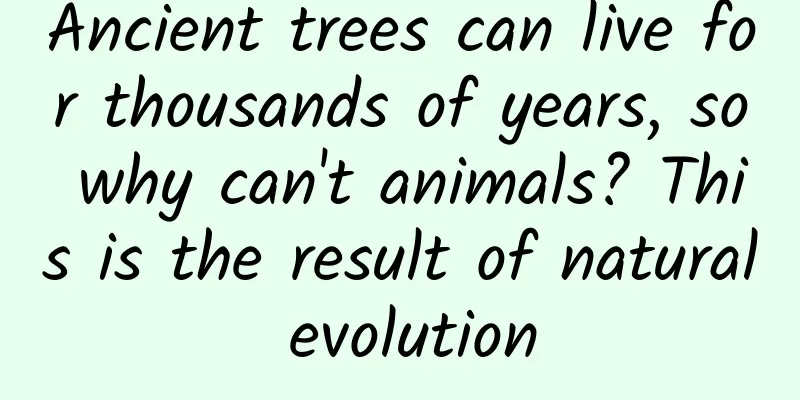Ancient trees can live for thousands of years, so why can't animals? This is the result of natural evolution

|
“I lament the brevity of my life and envy the infinity of the Yangtze River.” We always lament the brevity of our own lives, envy the endless flow of the Yangtze River, and envy the ancient trees that can stand for thousands of years without falling. So why can't we do it? Modern science can give many reasonable explanations for aging and death. For example, cell division shortens the telomeres on chromosomes, so the length of telomeres will limit the number of cell divisions, eventually leading to the aging and death of the body. However, this can only be regarded as a superficial factor, not the essential reason. Because the shortening of telomeres is not inevitable, some organisms, including some cells in our body, do not have the problem of telomere shortening. Since the shortening of telomeres is not inevitable, why must our telomeres shorten? To get a glimpse into the nature of aging and death, we need to look for the reasons in the evolution of organisms. As long as you have a deep understanding of the basic logic of biological evolution, you will find that no matter whether the starting point of an animal is high or low, it will eventually evolve towards the trend of aging and death. Now let's make an assumption, assuming that humans have a very high starting point from the beginning and have the ability to live forever, and see what changes the subsequent evolution will bring us. No organism is constant, because the genes of organisms will mutate. Why do genes of organisms mutate? If genes did not mutate, there would be no life in this world. The natural environment is not constant. Not only does it change, but also on a larger time scale, this change is quite amazing. If organisms cannot undergo gene mutation, then there is no way to adapt to environmental changes, and naturally there is no way to exist for a long time. Since organisms can undergo gene mutation, then there is a problem. This mutation is random and may be beneficial, harmful, or of course, neutral. It doesn't matter if harmful gene mutations occur, because harmful gene mutations can cause functional abnormalities in the body, thereby losing its competitive advantage and being eliminated in natural selection. However, this elimination mechanism is conditional. That is, the harmful effects of harmful mutations must appear before the reproduction stage of the organism, so that the mutant individual loses its competitive advantage before passing on its genes. But if the harmful effects of harmful mutations occur after the reproduction stage, then the harmful genes will be passed on. Therefore, polio will become less and less, while Alzheimer's disease will become more and more. Even if humans were born with the ability to live forever, they would not be able to maintain this ability forever. Why? Because random genetic mutations always occur. Once an individual has a mutation that causes aging, the gene will be passed on, and as more and more individuals have the aging mutation, humans will regain the ability to age over time. This is the basic logic of natural evolution. Moreover, the ability to age can be harmful in the later stages of life, but it can be advantageous in the early stages of life because it can give the body more powerful functions, so it is favored by natural selection. Given the basic logic of natural evolution, why can ancient trees stand for less than a thousand years? Because the advantages of the longevity genes of ancient trees occur before the reproductive period. Even if an ancient tree lives for a thousand years, it still has the ability to reproduce, and the longer the ancient tree lives, the stronger its reproductive ability. Why? Because the longer it lives, the bigger it is, the more branches it produces, and the more seeds it produces. Therefore, compared with those short-lived counterparts, it can have more offspring, and its genes have more opportunities to be passed on. Over time, short-lived trees are eliminated, and the ones left are long-lived guys. In contrast, animals have complex body structures, and their body size cannot be infinitely increased, and their reproductive ability cannot be infinitely improved, so longevity does not produce any advantages. For more information, please follow the official account: sunmonarch |
<<: Salted duck eggs will "ooze oil", where does this oil come from?
Recommend
The counterattack of the little green men: a review of the history of Android's counterattack against Apple
Once upon a time, Motorola and Nokia were synonym...
An aerial "warrior" with a "phoenix head" but wearing a "diaper"?
The bird of prey in diapers: the crested eagle Re...
How was the world's largest volcano formed? Chinese scientists propose a new model for the formation of submarine volcanoes!
Recently, Zhang Jinchang, a researcher at the Sou...
How Xiaohongshu’s professional brand account gained 30,000 followers overnight!
In recent days, the official account of Panpan Be...
The evolution of carnivorous plants is a story of job-changing genes
Before the 18th century, people generally believe...
1,402 electric bicycle fires occurred nationwide in July! Beware of 5 signs of battery explosion
#千万IP创科普# Recently, the national electric bicycle...
Growth strategy of the Douyin App
As Douyin exploded in 2019, more and more attenti...
Why does Yuan Longping, who has won numerous awards, value foreign awards more?
Editor’s Note: During the 100-year struggle of th...
How to write a good article? Practical methods from topic selection, title and content writing
As you know, writing articles is my hobby in my s...
Can Internet TV kill cable TV?
Xiao Liu, a white-collar worker in Zhongguancun w...
"White Paper on Large-screen Marketing in the Pharmaceutical and Healthcare Industry" is released, Huanwang helps pharmaceutical brands return to the main marketing position
The pharmaceutical and healthcare industry is clo...
14 professional operation tools that are essential for Internet operators!
As an Internet operation practitioner, if you wan...
Quark Product Operation Analysis Report
With the widespread promotion of mobile Internet,...
Don't buy this kind of dried flowers for indoor decoration! It's illegal!
During the New Year, everyone likes to buy some N...









